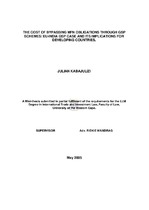The cost of bypassing MFN obligations through GSP schemes: EU-India GSP case and its implications for developing countries
| dc.contributor.advisor | Wandrag, Riekie | |
| dc.contributor.author | Kabajulizi, Julian | |
| dc.contributor.other | Faculty of Law | |
| dc.date.accessioned | 2013-06-19T13:49:34Z | |
| dc.date.available | 2007/03/30 10:43 | |
| dc.date.available | 2007/03/30 | |
| dc.date.available | 2013-06-19T13:49:34Z | |
| dc.date.issued | 2005 | |
| dc.identifier.uri | http://hdl.handle.net/11394/1504 | |
| dc.description | Magister Legum - LLM | en_US |
| dc.description.abstract | The principal objective of this research was a critical examination of the Generalised System of Preference schemes as a form of special and differential treatment under the Enabling Clause with specific reference to the complaint brought against the European Union (EU) by India regarding the EU's granting of tariff preferences to developing countries with illegal drug trafficking problem. | en_US |
| dc.language.iso | en | en_US |
| dc.publisher | University of the Western Cape | en_US |
| dc.subject | Favored nation clause | en_US |
| dc.subject | Trade blocs | en_US |
| dc.subject | Africa | en_US |
| dc.subject | Commerce | en_US |
| dc.title | The cost of bypassing MFN obligations through GSP schemes: EU-India GSP case and its implications for developing countries | en_US |
| dc.type | Thesis | en_US |
| dc.rights.holder | University of the Western Cape | en_US |
| dc.description.country | South Africa |

